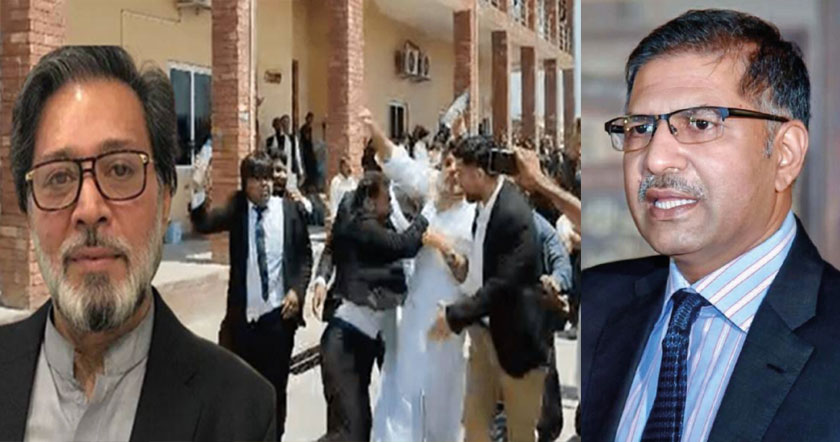Re: It is not permissible to greet or congratulate the kuffaar
I request you all... to always check the other views before reaching to a conclusion...
Because whenever I am confused about a matter referred by an Alim and look it up or question it... and all that I find is a statement...
???? ??? ?? ?????? ??? ?????? ?????????????
see what I found on this matter...
Rules of Greeting non-Muslims in Islam (Saying Salaam/Replying Salaam) By:Nurideen Lemu An-Nigeri
Published by Suhaib Webb on June 5, 2008 8 Comments
Rules Related to Greeting Non-Muslims in Islam:
Nurideen Lemu An-Nigeri
Preface
Muslims, just like the rest of mankind do not live in isolation. They live in a world of multi-religious and multicultural diversities. With globalization, the world is getting more and more exposed to new cultures, religions, and ideologies etc. If Muslims have to integrate into the so described global village, then good communication is a vital component. Just like it is in all civilizations, cultures and religions, greeting is the very social responsibility at the first point of contact. Consequently, how one greets another person can open the way for better interaction or halt further relationship. This becomes more important where the non-Muslim contemporaries vividly understand the meaning of the Muslims unique way of greeting and feel discriminated against, belittled or disrespected if they are denied the salutations of salaam (Peace). This grudge and rancor if left unattended could be detrimental to peaceful co-existence and subsequently threatening to the progress of Dawah. Therefore, this paper attempts to x-ray the actual facts about the subject from the Quran and Sunnah, and to clarify which opinion may be stronger or more applicable to our contemporary context.
It is hoped that this paper will help Muslims get a truer picture on this matter, and lead to greater respect for the divergence of opinion among Muslim scholars.
INTRODUCTION
Greeting is a moral act, a way of acknowledging presence, showing respect and courtesy. It is recognized as a norm in all cultures and civilizations. It is the first social right at the point of contact and cuts across religious and cultural barriers. It was quite ordinary in history that even opposing armies will engage in some form of mutual acknowledgement before the start of combat.
Islam, as a comprehensive way of life also recognizes this norm as a right, and goes to the extent of specifying how it should be done: Assalamu alaikum meaning peace be upon you or more perfectly: Assalamu alaikum wa Rahmatullahi wa barakatuh meaning Peace, Mercy and Blessings of Allah be upon you. In this regard, Allah says in the Quran: And when you are greeted with a greeting, greet (in return) with one which is better than it or (at least) return it (in like manner). Indeed, Allah is ever taking account of all things The greeting Allah is referring to here is generally understood to be Assalamu alaikum. He also described salaam as a greeting from Allah, blessed and good. Likewise the Prophet of Islam (Peace be upon him) was once asked: what aspect of Islam is among the best? He replied Giving food (to the needy) and saying salaam to whom you know and whom you know not. In another instance, he enjoined his followers to spread the greetings of salaam because it increases the love between them. He also said: It is not permissible for a person to desert his fellow brother for more than three days while they continue to meet and turn their backs to each other. And the best of them is the first to say Salaam. He also ruled: Let the young say Salaam to the elder, and the passerby to the seated, and the smaller group to the larger group.
Inevitably, Muslims live among relations, friends and well-wishers from other faiths. The salient question is: does this universal precious greeting of peace extend to them?
In discussing this topic, the rulings on issues having to do with initiating the saying of salaams will be treated separately as a section, and then followed by those related to replying or responding to salaam from non-Muslims.
SECTION A
INITIATING THE SAYING OF SALAAM TO NON-MUSLIMS
Muslim scholars in Islam have three major views concerning the saying of salaam to members of others faiths, such as Christians, Zoroastrians, Jews, Buddhists, Hindus, Animists. One group of scholars prohibits it, while a second group permits it. Yet a third group takes a midway position by saying when conditions call for it or make it necessary, Muslims may initiate the greeting of salaam.
It has been authentically reported from the Prophet (Peace be upon him) that he said:
Do not initiate Salaam with them. But it was said that this injunction was specifically when they were going to Banu Quraizah9. But the question is, is this a general rule applying to all non-Muslim citizens, or only to those who exhibits hostilities to Muslims as did the Banu Quraizah? This is a point of deliberation (among scholars).
?. PROHIBITION OF INITIATING THE SAYING OF SALAAM TO NON-MUSLIMS
A good number of Islamic scholars are of the view that it is prohibited to initiate the greeting of salaam to non-Muslims. They say salaam is meant to be exchanged among Muslims and that the verse of the Quran which spoke of greeting with salaam is referring to Muslim alone. This was the view of Ata bin Rabah They went further to say that salaam is to Muslims as shalom is to Jews. They backed their position with the Hadith reported by Abu Hurairah, where the messenger of Allah (Peace be upon him) said: You must not initiate the (greetings of) salaam with Jews and Christians,. They say, salaam is a greeting of honor and a nonMuslim (kafir) does not deserve to be honored. Ahmad Bin Hanbal commented on the above Hadith: Going by this Hadith is better than any other contrary opinion. Ibn Hajar is of similar opinion, while commenting on the above Hadith, he said: The most credible of all these (views) is what is evident in the above Hadith, although it is specific to the People of the Book. Ibn Katheer also, while commenting on the verse on greeting (Quran 4:86) said: But as to non-Muslim citizens (Alum Dimmit) one should not initiate to them the greetings of salaam Abu Haneefah and Malik Bin Anas detested initiating salaam with non-Muslims.
Proponents of this opinion argue further that the salaam meant for greeting is among the peculiarities of this Ummah of Prophet Muhammad as reported by Anas bin Malik, who said that the Prophet (Peace and Blessings of Allah be upon him) said: Indeed, Allah has given my Ummah three things that were not given to any other Ummah before me: saying salaam, and it is the greeting of the people of Jannah (Paradise)
Imam An-Nawawi reconciled between the ahadith that enjoyed greeting and those that prohibit initiating salaams to non Muslims as follows: The ahadith that enjoined spreading the greetings of salaam is a generalization (Aam), from which the people of the book were excluded
This group go further to assert that the salaam that Prophet Ibrahim (Peace be upon him) said to his father in Quran 19:47 was a mere farewell and good will, and it was not meant as a greeting.
From among the contemporary scholars, Ibn Uthaimeen holds a similar opinion. He believed initiating greetings of any sort with non-Muslims is a sort of honor given to them which they dont deserve. He categorically spelt out that it is prohibited (Haraam) to greet them with salaam. He further said: Because it is a humiliation for a Muslim when he starts to honor a non-Muslim. Shaykh Abdul-Azeez Bin Baaz while commenting on the Hadith earlier stated, said: This indicates that we respond to them if they initiate it. It is initiating it that is prohibited Scholars of the Shafii Madhhab uphold the prohibition of initiating salaam to a non-Muslim citizen. However, they permitted initiating with other local greetings only when the need arises, because it is an expression of love. They argued further that Allah the Most High has warned: You will not find any people who believe in Allah and the Last Day making friendship with those who oppose Allah and His Messenger,.. However, some of the Shafii Madhhab scholars consider it to be merely detestable (Makruh).
II. PERMISIBILITY OF SAYING SALAAM TO NON-MUSLIMS
Another group of scholars consider it permissible to commence the saying of salaam to a non-Muslim. They say this view is in harmony with how Quran represents the Islamic greeting of peace as a universal greeting. They advance their argument on the basis of the following texts:
O you who believe, enter not into houses other than yours without first announcing your presence and invoking peace (saying salaam) upon the folk thereof. That is better for you, that you may be heedful
And servants of (Allah) the Most Gracious are those who walk on the earth in humility, and when the ignorant address them, they say, Peace (Salaam)!
Consider his cry: O my Lord! Surely they are a people who do not believe! So turn away from them and say Salaam (Peace) for they shall soon come to know.
Also, And when they hear ill speech, they turn away from it and say, For us are our deeds and for you are your deeds, peace be upon you; we seek not the ignorant
The Prophet (Peace be upon him) said: Greet with Peace those whom you know and those whom you do not know He also informed us that when Allah created Adam, He commanded him Go to that assembly and they were an assembly of seated angels and listen to how they greet you. Indeed, it is your greeting and the greeting of your descendents. He said: Peace be upon you they said: Peace be upon you and Allahs Mercy
The Prophet (Peace be upon him) also said: Spread the greeting of peace
In response to the hadith quoted by the first group, they agree that it relates to the state of hostilities which erupted between the Jews and the Muslims at the time of campaign against Banu Quraizah. They supported this assertion by a Hadith where the Prophet (Peace be upon him) said: We are going forth in the morning against a group of Jews, so do not initiate the greeting of Peace with them
More so, a good number of the companions hold the same opinion. Abdullahi bin Masud once said salaam to a non-Muslim. When asked: Are we not warned against initiating salaam with them? He replied: It is a right of companionship. He once wrote a letter to a non-Muslim and said therein, Assalamu alaik Peace be upon you. Abu ad-Darda, Abdullahi bin Abbas, Fudalah bin Ubaid and Ibn Muhairiz were also of the same view. It was equally reported that, Abu Umamah Al-Bahily do used to say salaam to whoever he passed by, Muslim or non-Muslim, and used to say, it is a greeting for the people of our religion, and an assurance of security to our non-Muslim citizens, and a Name among the Names of Allah we spread among ourselves. Notable among the prominent pious predecessors of the second generation was Sufyan bin Uyaynah, who when asked whether a Muslim can salute a non-Muslim with salaam, replied in affirmation and quoted the saying of Allah Allah does not forbid you in respect of those who do not fight you because of your religion and do not expel you from your homes from being righteous and dealing justly towards them. Indeed, Allah loves those who act justly
Imam Awzaiy said: If you say salaam to them (the non-Muslims), then surely (some) pious people did the same, and if you dont, indeed, (some) pious people did the same. Umar Bin Abdul-Azeez said: I feel no qualm in initiating salaam to them, because of the saying of Allah: So turn away from them and say salaam (Peace), for they shall soon come to know Al-Shaabi is also of the same understanding. He once said to a Jew Peace and Allahs Mercy be upon you (Alaikas-Salam wa Rahmatullah), so it was said to him You told a Jew Warahmatullah? He replied back saying: Isnt he living in Allahs Mercy?
Proponents of this view explained that the rationale behind the prohibition of initiating salaam was that some of the Jews used to greet the Prophet with As-Saamu alaik meaning Death be upon you. However, if they change, and there is peaceful co-existence, nothing stops us of from initiating salaam. This view is equally supported by Imam Qurtubi.
III PERMISIBILITY ON CONDTION
The third category of scholars are those that see salaam to be permissible on necessities such as seeking help from them, companionship, a journey, or some other necessity, or if such non-Muslim are relations. This view tries to reconcile between the first two. They say that the Hadith of prohibition is applicable when conditions do not call for saying salaam. They support this assertion by a Hadith related by Usamah bin Zaid that the Prophet (peace be upon him) passed by a company of people which comprised Muslims, idol worshippers and Jews, and he greeted them with the salutation of peace (salaam). They say the only way to reconcile between the Hadith of prohibition and the above is permissibility but only when necessary. Notable among members of this group are: Ibrahim An-Nakhaiy, Alqamah and Al-Shaby.
It is observable that the Prophet did not state any condition for His action in this hadith. Did He intend the greeting for only the Muslim s in the group, with the non Muslims as collateral beneficiaries? Or did He intend the greeting for all irrespective of their faith? In as much as the hadith exclude any condition, it is safe to assume that the Prophets greeting was directed to everyone in the group, Muslim or non Muslim.
SECTION B
RESPONDING TO SALAAM FROM NON-MUSLIMS
Nearly all the scholars have unanimously agreed that it is compulsory to reply salaams from a non-Muslim just as if he or she were a Muslim. This ruling is based on the verse of the Quran where Allah is says: And when you are greeted with a greeting, greet (in return) with what is better or (at least) return it (in a like manner)
Sufyan At-Thawri reported from Al-Hasan Al-Basari: Initiating the saying of salaam is voluntary, but replying to the greeting of salaam is compulsory. Ibn Katheer said: This statement of Al-Hasan Al-Basari is the position of all scholars unanimously.
From the Madh-hab point of view, Hanafis and Malikis consider responding to salaam from a non-Muslim to be permissible, while scholars from Shafii and Hanbali Madh-habs consider it to be compulsory. However, scholars differ on how the reply should be.
The first category believe that the response to their greeting of salaam should be waalaikum (And upon you too) or Alaikum (let it be upon you) and no more. Their evidence is the popular Hadith of Anas Bin Malik related by Bukhari and Muslim; that the Messenger of Allah said: When the people of the Book offer you salutations, you should say: the same to you (waalaikum). In another tradition it is related that the companions said to the Prophet: The People of the Book offer us salutations (by saying as-Salaamu-alaikum). How should we reciprocate? There upon he said: say: Waalaikum (and upon you too). In the text narrated by Abdullahi bin Umar: Allahs Messenger said: When the Jews greet you, they usually say, As-Saamu alaikum (Death be on you), so you should say (in reply to them), waalaikum (And on you too). In the same vein, Aisha narrated: The Jews used to greet the Prophet by saying, As-Samu Alaika (death be upon you), so I understood what they said, and I said to them, As-Samu alaikum wal-lana (Death and Allahs curse be upon you). The Prophet said, Be gentle and calm, O Aisha, as Allah likes gentleness in all affairs I said, O Allahs Prophet! Did you hear what they said? He said, Didnt you hear me answering them back by saying, Alaikum (the same be upon you).
Ibn Abbas commented on Quran 4:86 thus: Greet (in return) with what is better applies to a believer, but if it is a non-Muslim, reply with what the Messenger of Allah has instructed to be said to them waalaikum (And upon you too) Imam Al-Tabari while commenting on the same verse said And already, the Sunnah has excluded non-Muslims from benefiting from the response that is better by the instruction to respond with Waalaikum Therefore, it is not befitting for anybody to transgress the bounds laid by the messenger of Allah (Peace be upon him) in that regard. They supported this assertion with a Hadith reported by Anas, where he said: We were instructed not to say more than waalaikum (And upon you) in response to the greeting of the People of the Book.
The second category of scholars in this regard believe that in replying the salaam of a non-Muslim, one can go as far as saying Waalaikumus-Salaam (And Peace be upon you) provided one is sure the persons salutation is an actual greeting salaam. They say when Allah was instructing the reply to a greeting, it was a generalized instruction that came in passive form And when you are greeted with a greeting, greet (in return) with one better than it or (at least) return it (in a like manner). He (Allah) did not say And if you were greeted by a Muslim
Ibn Masud said: Even if Pharaoh (Firaun) said good words to me, I would respond to him with similar (good words). Abdullah bin Abbas also said while explaining the verse on greeting (Q4:86) Whoever says salaam to you among the creatures of Allah reply him, even if he is a Zoroastrian (Majus). A group of scholars from the Shafii Madhhab also hold this view
Some of the members of the group believe one can say Waalaikumus-Salam (Peace be upon you also) only, without warahmatullah (And Allahs Mercy) while majority of them believe the response should be according to the greeting. This group went further to interpret the reply to a non-Muslim to mean supplication and good will.
Notable among proponents of this opinion include Shaikh AbdulAziz bin Baaz where he said:
If a non-Muslim greets us, we respond in the same manner that he/she greets us with. So if one (of the non-Muslims) says: As Salaamu Alaikum clearly when greeting us, we respond by saying Alaikum as Salaam, if one says Ahlan wa Sahlan we respond with Ahlan wa Sahlan, and if they say good morning, we respond by saying good morning. We greet them in the same way that they greet us acting on the order of Allah the Mighty and Majestic (Q4:86)
Shaikh Muhammad Bin Salih al-Uthaimeen also share similar view in the statement below:
If a non-Muslim greets a Muslim by saying al-saamu alaykum (Death be upon you), then we should respond by saying wa alaykum (and also upon you). The fact that the Prophet (Peace and Blessings of Allah be upon him) said: wa alaykum (And upon you also) indicates that if they were saying as-salaamu alaykum (Peace be upon you), then peace will also be upon them, that is, whatever they say to us, we say to them. Hence some of the scholars said that if a Jew, Christian or other non-Muslim clearly says al-Salaamu alaykum, it is permissible for us to say Alaykum al-Salaam (upon you peace be)
To wind up this segment of the discussion, let us cite the statement of Ibn Qayyim:
If it is confirmed that the non-Muslim citizen (Dhimmi) said salaam alaikum (clearly), the dictates of the principles of Jurisdiction and the rulings/evidence of the Shariah is in line with replying with wa alayka as-salaam (and upon you be peace), because this is more of just and kind. More so, Allah the Most High has said: And when you are greeted with a greeting, greet (in return) with what is better or (at least) return it (in like manner). He thus encourages replying with what is better and has mandated justice. And this in no way contradicts any of the ahadith in this chapter, because, the instruction of replying with wa alaykum (and upon you too) was in consequence of what the Jews deliberately did in their greeting. The Hadith of Aisha (May Allah be pleased with her) pointed to this, while the Prophet (peace and blessings of Allah be upon him) said, Dont you see me responding to them by saying wa alaykum (And upon you)? Then he instructed: If the people of the book say salaam to you (in greetings), say to them and upon you. Although the entirety of the text is considered, the context and the factors underlying it are also important. So, if the precursor ceased, and the People of the Book say: Salaamun alaykum wa Rahmatullah (Peace and Mercy of Allah be upon you), justice in greeting demands that they should be replied in similar way. Perfection belongs to Allah
CONCLUSION
This paper has attempted to show that the Hadiths specifically excluding the People of the Book from the salutations of Salaam have been understood by a group of scholars to be a generalized injunction. They therefore ruled that it is unlawful to initiate salutations of salaam with non-Muslims such as Jews, Christians, Pagans, and Zoroastrians and others.
Another group considers the related verses of the Quran, several Hadiths and the context surrounding the specific Hadith on prohibition, and viewed it to be permissible to initiate greetings of Salaam with a non-Muslim. This group understands the Hadith on prohibition to be specific to a particular instance and context. In accordance with the view of this group of scholars, therefore, it is only the presence of similar hostile condition that warrants the prohibition of initiating salaams with non Muslims.
It is worth mentioning that some Companions saw the salutations of Salaam to be a right of companionship. This implies that the context may also be important.
However, virtually all scholars seem to have no problem with responding to Salaam from non-Muslims in consideration of the instruction of Allah in Quran 4:86.They only differ on the format of the reply.
Greeting in whatever form is considered by Scholars of Principles of Jurisprudence (Usool al-Fiqh) to be among social transactions (Muamalat) regarding which the basic principle of Jurisprudence governing it is permissibility, except otherwise prohibited by Islamic Law (Sharia).
Sufyan At-Thawri was reported to have said If you see a man doing something over which there is difference of opinion among scholars, and which you believe to be forbidden, you should not forbid him from doing it
He also said: If you say salaam (to the non-Muslims), then surely (some) pious people did the same, and if you dont, indeed, (some) pious people did same.
After affirming that Allah knows best concerning all affairs, it is only befitting to end this discussion with the beautiful greeting in question,
Assalaamu Alaikum Warahmatullaahi Wabarakaatuh.
http://www.suhaibwebb.com/blog/minority ... an-nigeri/









































